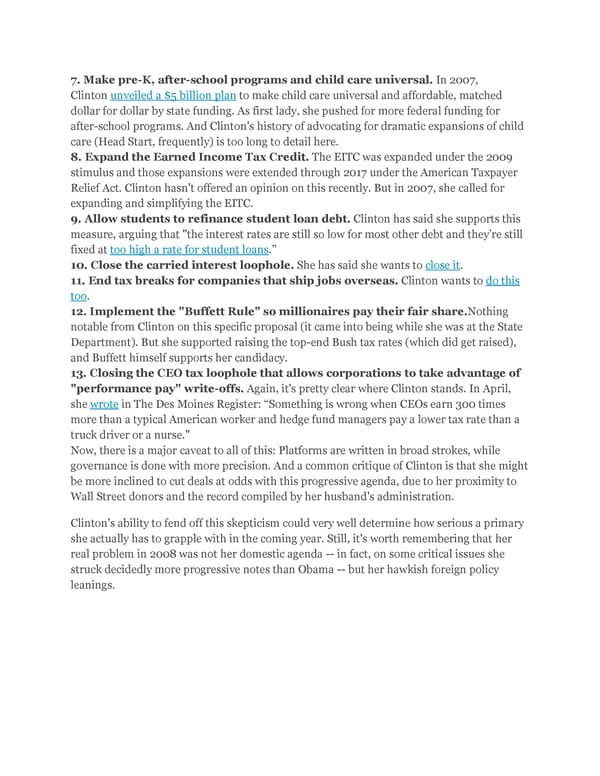7. Make pre-K, after-school programs and child care universal. In 2007, Clinton unveiled a $5 billion plan to make child care universal and affordable, matched dollar for dollar by state funding. As first lady, she pushed for more federal funding for after-school programs. And Clinton's history of advocating for dramatic expansions of child care (Head Start, frequently) is too long to detail here. 8. Expand the Earned Income Tax Credit. The EITC was expanded under the 2009 stimulus and those expansions were extended through 2017 under the American Taxpayer Relief Act. Clinton hasn't offered an opinion on this recently. But in 2007, she called for expanding and simplifying the EITC. 9. Allow students to refinance student loan debt. Clinton has said she supports this measure, arguing that "the interest rates are still so low for most other debt and they’re still fixed at too high a rate for student loans.” 10. Close the carried interest loophole. She has said she wants to close it. 11. End tax breaks for companies that ship jobs overseas. Clinton wants to do this too. 12. Implement the "Buffett Rule" so millionaires pay their fair share.Nothing notable from Clinton on this specific proposal (it came into being while she was at the State Department). But she supported raising the top-end Bush tax rates (which did get raised), and Buffett himself supports her candidacy. 13. Closing the CEO tax loophole that allows corporations to take advantage of "performance pay" write-offs. Again, it's pretty clear where Clinton stands. In April, she wrote in The Des Moines Register: “Something is wrong when CEOs earn 300 times more than a typical American worker and hedge fund managers pay a lower tax rate than a truck driver or a nurse." Now, there is a major caveat to all of this: Platforms are written in broad strokes, while governance is done with more precision. And a common critique of Clinton is that she might be more inclined to cut deals at odds with this progressive agenda, due to her proximity to Wall Street donors and the record compiled by her husband's administration. Clinton's ability to fend off this skepticism could very well determine how serious a primary she actually has to grapple with in the coming year. Still, it's worth remembering that her real problem in 2008 was not her domestic agenda -- in fact, on some critical issues she struck decidedly more progressive notes than Obama -- but her hawkish foreign policy leanings.
 HRC and Progressive litmus Test Page 2
HRC and Progressive litmus Test Page 2